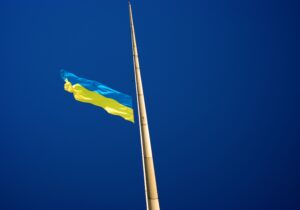With Vladimir Putin’s planned two-day war to topple Ukraine’s democratically elected government now in its third month and Russian casualties piling into the tens of thousands, concerns abound that Putin might take increasingly drastic steps—deploying a nuclear weapon, conducting a false-flag chemical attack, lunging at another neighboring country—to alter the disastrous situation he faces on the battlefield. To prevent those grim prospects—or at least contain their effects—President Joe Biden should turn to the playbook his predecessors drafted.
Public
Let’s start with the most worrisome possibility: the deployment of a nuclear weapon or other weapons of mass destruction. Putin’s invasion of Ukraine is awful, but his use of nuclear, biological, chemical, or radiological weapons would be worse. The United States and its allies must be prepared for the worst and must do everything reasonably possible to deter the worst—just as they did throughout the Cold War.
Putin and his henchmen have been rattling nuclear sabers and hinting at chemical attacks for months. These should not be dismissed as empty threats. After all, Putin’s regime endorses the idea that nuclear weapons can be deployed to somehow deescalate a military conflict, has used nerve agents to target its enemies, deployed chemical agents against Chechen rebels, and abetted Assad’s chemical attacks in Syria.
Isolated on the global stage and stymied on the battlefield, Putin could conclude that he has nothing to lose. That’s not a good place for a person with 4,500 nuclear warheads. So Putin must be made to understand that he has something to gain by ending this war and that he has everything to lose if he deploys WMDs. Biden has promised “severe consequences” if Russia uses WMDs. But the message must be firmer, sharper, and clearer.
Like President John Kennedy during the Cuban Missile Crisis of 1962, the president could deliver a formal address underscoring the seriousness of the threat and the consequences. “It shall be the policy of this nation,” Kennedy declared, “to regard any nuclear missile launched from Cuba against any nation in the Western Hemisphere as an attack by the Soviet Union on the United States, requiring a full retaliatory response upon the Soviet Union.” He added, “Our unswerving objective… must be to prevent the use of these missiles against this or any other country.”
In the same way, Biden could declare that the use of any nuclear weapon—tactical or otherwise—would be considered an attack by Russia against the United States prompting a retaliatory response upon Russia; that WMD attacks of any kind would invite a retaliatory response upon Russia; and that the US is publicly articulating such a policy solely to deter the use of these weapons. Biden said in March that a Russian WMD attack would trigger “a response in kind,” though that was an off-the-cuff comment. Prepared remarks from the Oval Office carry more weight—and deliver a stronger punch.
In this crisis, as during the Cuban Missile Crisis, the purpose of such a statement would be to remove any doubt about the consequences of breaching the WMD threshold. Unlike during the Cuban Missile Crisis, Washington will be able to deliver the message directly to unit commanders via cyber capabilities—thus putting on notice those ordered to pull the trigger.
Private
Like President George H.W. Bush during the Gulf Crisis of 1990–91, the president could dispatch a trusted emissary to privately underscore those consequences for someone inside Putin’s inner circle. Less than two weeks before he ordered US forces to begin the liberation of Kuwait, Bush sent Secretary of State James Baker to meet with his Iraqi counterpart and deliver a letter to Saddam Hussein. That letter explained, “The United States will not tolerate the use of chemical or biological weapons… The American people would demand the strongest possible response. You and your country will pay a terrible price if you order unconscionable acts of this sort.”
In a similar way, Biden could quietly send a nongovernment emissary who knows the neighborhood— Robert Gates led the Pentagon and was a Soviet expert at the CIA, Leon Panetta led the CIA and Pentagon, James Mattis led the Pentagon and a key NATO command, Joseph Dunford was chairman of the Joint Chiefs, James Stavridis and Curtis Scaparrotti commanded NATO—to deliver to his Russian counterpart a personal message from the leader of the Free World: “The United States will not tolerate the use of chemical, biological, radiological, or nuclear weapons by the Russian military, its proxies, or its intelligence services. If these weapons are used, President Putin’s inner circle, the Russian military, and Russia’s intelligence and security services will pay a terrible price—far worse than anything Russia has endured so far in Ukraine.”
The message—and we can hope something like it has already been delivered—could be underscored by quietly repositioning certain military assets. The operative word here is “quietly.” The purpose of such movement would be to send a signal for the benefit of Russian generals, spies, and satellites—not to publicly challenge Putin and thus trigger an escalating trial of strength. After all, Putin’s Russia is not Saddam Hussein’s Iraq. Even so, Russia’s status as a nuclear power doesn’t eliminate US options, and it doesn’t mean Putin should be comfortable with those options.
Fundamentals
There are reports the Russian military is stealing Ukrainian grain, preventing stocks of Ukrainian grain from being shipped via the Black Sea, and endangering and threatening international commercial shipping into and out of the region. In response, Biden could borrow a page from President Ronald Reagan.
Freedom of the seas and the freedom to conduct commerce via the seas are fundamental to the existence of nation-states. When Iran violated this principle by attacking commercial shipping in the Persian Gulf in the late 1980s, Reagan allowed friendly commercial vessels to be reflagged with the Stars and Stripes and ordered US warships to escort those vessels to ensure the free flow of commerce and defend freedom of the seas.
Declaring that “the use of the vital sealanes of the Persian Gulf will not be dictated by the Iranians” and “will not be allowed to come under the control of the Soviet Union,” Reagan built a maritime coalition to protect those sealanes. “Freedom of navigation is not an empty cliche of international law,” he noted. “It is essential to the health and safety of America and the strength of our alliance.” He explained that failing to defend this fundamental principle “will jeopardize our own national security as well as our allies.”
In a similar way, Biden could announce the formation of a humanitarian maritime taskforce to protect commercial shipping and to ensure freedom of the seas into and out of the Black Sea. How would it be “humanitarian”? Ukraine accounts for 10 percent of global wheat supply and 15 percent of global corn supply—and an especially large share of wheat imports for the Philippines (15 percent), Egypt (15 percent), Morocco (20 percent), Thailand (26 percent), Indonesia (26 percent), and Tunisia (48 percent). The more of Ukraine’s grain that can be delivered, the less likely these countries will go hungry. Several allies would join this effort. For those allies concerned about the need for some sort of blessing from international law, Articles 11, 14, 51, 52, and 55 of the UN Charter seem to check that box.
Prevention
Putin’s regime is threatening Moldova and planning to form a land bridge linking Russian-occupied Moldova with Russian-occupied Ukraine. This would destabilize Moldova’s democratic government, widen the war, render Ukraine landlocked and threaten NATO member Romania.
Here, Biden could build on the groundwork his predecessors laid in the Sinai and the Balkans.
In 1979, as Israel and Egypt edged toward peace, President Jimmy Carter provided written assurances that if the UN Security Council “fails to establish and maintain the arrangements called for in the treaty, the president will be prepared to take those steps necessary to ensure the establishment and maintenance of an acceptable alternative multinational force.” The result came to be called the Multinational Force and Observers peacekeeping mission, which was implemented by Carter’s successor and has been deployed in the Sinai since 1981. Calling the effort a “unique peacekeeping initiative,” Reagan declared that “US participation in this critical step will contribute to our broader efforts to bring about a just and lasting peace in the region.”
More than a decade later, with Serbian strongman Slobodan Milosevic waging a war of ethnic cleansing across much of Yugoslavia, President Bill Clinton dispatched US troops to Macedonia as part of a peacekeeping force designed solely to prevent Milosevic’s war from spreading. Noting that “we don’t intend to see this conflict widen,” Clinton argued that the “deployment carries minimal risk and carries maximum gain.”
Both of these efforts proved highly successful.
In a similar way, at the invitation of the Moldovan government (which opposes Russia’s occupation of an eastern sliver of the country), Washington could work with partners like the European Union (which is expanding military support for Moldova) to deploy observers along the Moldova-Ukraine border and the borderlands of the so-called Trans-Dniester region. Moldova’s president has called for international observers. As we saw in the Sinai, such a force doesn’t need UNSC approval. (Again, the mission could be justified under Articles 14 and 52 of the UN Charter.) And as we saw in Macedonia, such a preventive peacekeeping effort could focus solely on stopping the spread of war.
Arsenals
Underlaying all of this must be a continued commitment to supplying Ukraine with the weapons it needs to defend itself against Putin’s war of aggression. The words and actions of President Franklin Roosevelt serve as a guidepost here. “Such aid is not an act of war,” FDR explained, “even if a dictator should unilaterally proclaim it so to be.” Hardened against moral relativism, FDR understood that providing arms to resist aggression and employing those arms to resist aggression are definitively not acts of aggression.
Biden is doing well in this regard. Congress is even helping him reignite FDR’s “great arsenal of democracy” by reviving the Lend-Lease Program that initially helped Britain fight Nazi Germany alone and ultimately dismantled the Axis.
Options
“Blessed are the peacemakers,” Jesus declares and instructs. Sadly, grimly, none of the options outlined here will immediately bring about peace. However, they could help contain war—both its breadth (the nations affected) and depth (the escalatory possibilities).
Even so, this “playbook” is surely an unsatisfying half-measure for those who, understandably, want Putin removed and Ukraine restored—and a dangerous step down the slippery slope for those who, understandably, worry about direct US involvement in Putin’s war. Indeed, this playbook carries risks. However, nothing in this playbook is an act of aggression. All of these options are responses to Russia’s war of aggression and words of aggression. If the aggression ends, the response changes. What we must remember is that presidents don’t have the luxury of choosing the perfectly safe or perfectly just or perfectly righteous option. Instead, they must choose the least bad option. As Reinhold Niebuhr wrote during an earlier confrontation with Moscow, “We take, and must continue to take, morally hazardous actions to preserve our civilization.”







 Sponsor a student for Christianity & National Security 2024
Sponsor a student for Christianity & National Security 2024